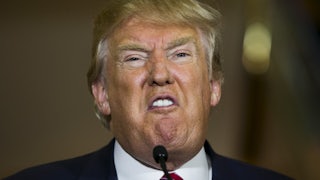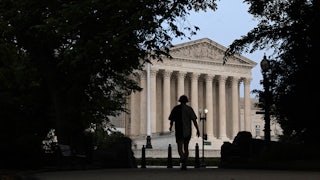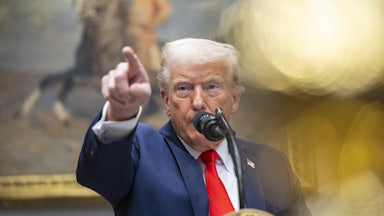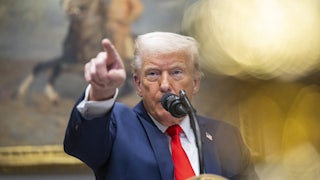Lord knows when Donald Trump will stand trial for trying to overturn the 2020 election. There’s no trial date set for the Georgia case or the federal case. By the time they begin, Trump will either be serving a second term as president or trying very hard to overturn the 2024 election. Either way, Trump likely will be a convicted felon, found guilty by New York State of falsifying business records to cover up the payment of hush money to Stormy Daniels—but not of trying to stage a coup.
Until Trump is brought to justice for that, the most prominent Republican brought to justice for his role in the January 6, 2021, insurrection will be L. Brent Bozell IV. The man known to his friends as Zeeker was convicted last fall on 10 charges related to his participation in the January 6 insurrection—five of them felonies—and sentenced last week to 45 months in prison.
Zeeker’s notability is an accident of history. He is the last in a line of four L. Brent Bozells, regarded by many as the first family of American conservatism. That reputation is due mainly to the accomplishments of the second L. Brent Bozell. As I explained in February 2022 (“The Rise and Fall of the L. Brent Bozells”), L. Brent Bozell Jr. (1926–1997) was a principal creator of the “new right” that swept Ronald Reagan to power in 1980. He helped his brother-in-law William F. Buckley found National Review; co-authored with Buckley a 1954 book defending Joe McCarthy; and ghostwrote Barry Goldwater’s campaign biography, The Conscience of a Conservative. Junior was extremely brilliant and, as the years wore on, extremely nuts, eventually becoming a passionate defender of the murderous Spanish dictator Francisco Franco, an obsessive scourge of Vatican II, and a fanatical activist against Roe v. Wade.
Junior’s son, L. Brent Bozell III, was milder-mannered, unexceptional in the brains department, but still very conservative. He ran two prominent organizations that helped translate the new right into a political movement: the National Conservative Political Action Committee (which he took over after the death from AIDS complications of its closeted gay founder, Terry Dolan) and the Media Research Center (which he founded, and which is committed to pillorying the mainstream media for being too left-wing).
Zeeker’s contribution to the conservative cause—his only contribution, as best I can make out—is his participation in the January 6 attack on Congress. We would call him a “troubled youth” if he weren’t 44 years old and a father of three. According to his lawyers’ sentencing memo, Zeeker grew up in Northern Virginia, drank to excess in high school, left Hampton-Sydney College without a degree, moved to Pennsylvania, and today makes his living working on commission as a salesman for two companies, one that waterproofs basements and one that sells aluminum siding. His lawyers tried to convey, as gently as they could manage, that Zeeker is none too bright, quoting one of his bosses saying he was an “idiot” who “got caught up in something.”
The prosecution took a harsher view. “There are few rioters on January 6 who were involved in as many pivotal breaches as Bozell,” they wrote in their sentencing memo:
He positioned himself at the forefront of the mob during pivotal moments of the attack as he actively and aggressively propelled the momentum of the mob from the Senate Wing Doors—where he personally created entry points for hundreds of rioters—all the way to the Senate Chamber, which he occupied rendering it impossible for Congress to meet.
Zeeker, prosecutors said, “was in the first group of the rioters to enter the Capitol” and “joined others in a menacing pursuit” of a Capitol Police officer. In the Senate chamber, he “maneuvered one of the video cameras towards the floor to obstruct its recording” and directed others to do the same.
Although Zeeker doubtless was an idiot who got caught up in something, he got caught up in it well before January 6. He planned in advance to go to the Capitol and acknowledged that “things are going to get violent” there. He texted, “I’m bringing lighters, fire starters” and boasted that he’d be “tossing [Representative Adam] Schiff’s office on 1-6.” (Zeeker tossed Nancy Pelosi’s office instead.) Afterward, Zeeker felt no particular remorse. “Capitol siege is morally justified,” he texted. “If power is stolen by child rapists and murderers, then any attempt to stop them is morally justified.” Zeeker also chided his father for “condemning all violence” committed on January 6.
The evidence prosecutors obtained against Zeeker was overwhelming. But Zeeker didn’t cut a deal; he insisted instead on going to trial, and then he insisted on taking the stand, where he spouted whoppers with such abandon that Judge John D. Bates had trouble believing his ears:
Judge Bates: Did you testify that in terms of thinking that one of the law enforcement officers said ‘let’s go,’ that you thought the police had led you up the stairs and that you’d been duped into being led up the stairs? If you thought you’d been duped into being led up the stairs, why did you just continue on being duped into breaking into the Capitol and going into the Capitol?
Zeeker: That’s a great question. That’s actually something I didn’t think until late—after, when I was assessing it.
Bates: What didn’t you think after?
Zeeker: That I’d been duped.… So as I reviewed it in my head, like, come on, something weird’s going on here. The police officers brought the crowd up. How did that happen?
Here’s how Zeeker described pointing the Senate cameras to the floor:
I get a yell from another protester, hey, there’s cameras. Come check it out. So, okay. So I go down to the camera and to go check it out.… I didn’t really have any motivation other than I’m in here and there’s a camera and somebody suggested it’s something neat to look at. I didn’t have any—I didn’t have any purpose behind it.
Here’s how Zeeker described breaking the windows of the doors on the Capitol’s west front to let the mob inside:
Zeeker: My motivation was to break something.
Prosecutor: And your motivation was to break something because you wanted to get into the Capitol building, didn’t you?
Zeeker: It’s more like you just want to punch the wall to see—to get the—to get the frustration out.… It was the only thing up there that was breakable. Had there been a flower pot, this may be a different.… I was never part of a mob.
It wasn’t, Zeeker testified, until he broke a second window (by banging on it 10 times) that it occurred to him he might perhaps venture inside. He wandered into the Senate chamber, he said, not knowing until he was inside that it was the Senate chamber, and once inside he stayed only because he thought it would be a good rendezvous spot to meet up with his mother, whom he believed, mistakenly, to have entered the Capitol. “I wasn’t leaving without my mom,” he said. (Norma Bozell had walked to the Capitol with her son and then left.) Zeeker also claimed that he blundered into Speaker Nancy Pelosi’s office:
Prosecutor: And you ended up in Nancy Pelosi’s office, didn’t you?
Zeeker: I didn’t know that was—
Prosecutor: You didn’t see the big sign on top of the door that said, “Speaker Pelosi”?
Zeeker: It seems—walking around.
At sentencing last week, Judge Bates took Zeeker to task for the “ease, and, at times, brazenness” of his trial testimony, giving answers that “defied both video evidence and common sense.” The judged said this was a consideration in giving Zeeker so long a sentence (the prosecution sought a much longer one). “You got caught up in events, but you’re a sophisticated adult,” Judge Bates said. (I wouldn’t go that far.) “You made the decision to testify.”
And so he did. No word yet about an appeal, but for the moment at least the conservative movement will muddle through without a fourth L. Brent Bozell. Zeeker’s foolishness is surpassed only by his sense of entitlement. If Trump is elected president, he will surely be pardoned. If not, justice will be served.








